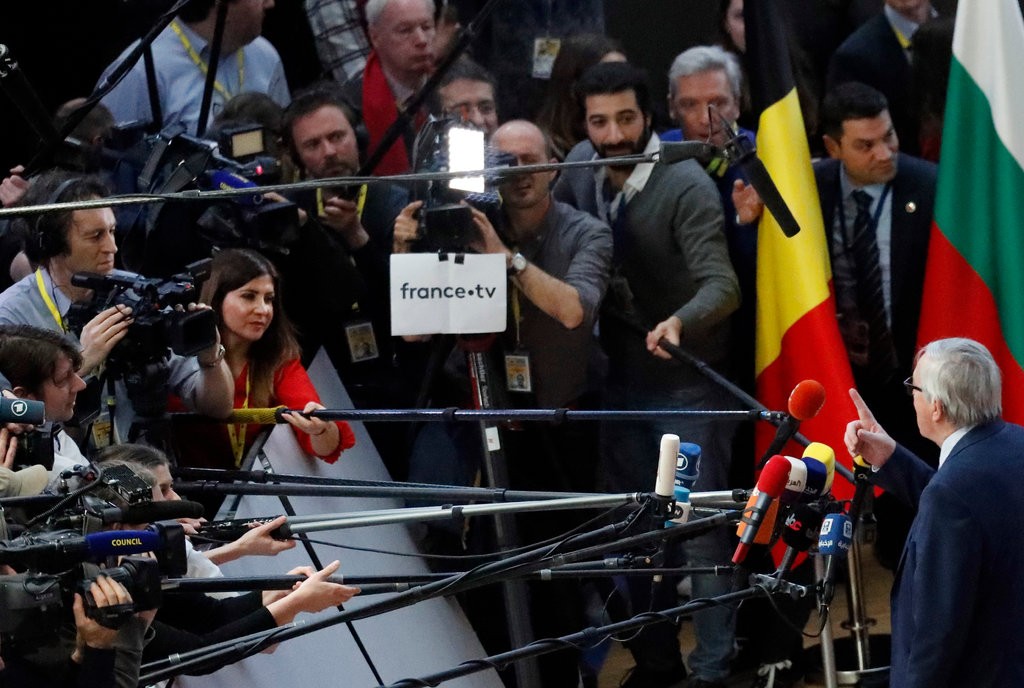E.U. Approves Brexit Extension, but Chaotic Departure Still Looms
BRUSSELS — European Union leaders on Thursday agreed to extend the deadline for Britain’s looming exit from the bloc in order to give Prime Minister Theresa May and the British Parliament more time to get their act together.
Thursday’s agreement effectively averted the possibility of a disorderly and possibly chaotic departure by Britain on March 29. Yet that still remains a possibility just a few weeks later.
After hours of difficult and sometimes passionate talks, the leaders decided that Britain’s exit date will be pushed back to May 22 if next week Mrs. May can persuade lawmakers in Parliament to accept her plan for leaving the bloc, which they have already rejected overwhelmingly, not once but twice.
If she cannot persuade lawmakers to accept her plan, Mrs. May will get a shorter delay in exiting the European Union — until April 12. But Britain could stay in the bloc longer if it decides it needs more time for a more fundamental rethink of Brexit, as the process is known.
For a longer extension, though, it would have to take part in elections to the European Parliament in May — something Mrs. May said early Friday would be an absurdity, three years after Britons voted in a referendum to leave the bloc.
Speaking at a news conference after the extended deadlines were announced, Donald Tusk, president of the European Council, said that until April 12, “all options will remain open and the cliff-edge date will be delayed.”
But he added that if there was no agreement in Parliament, and Britain had not indicated by April 12 that it was willing to take part in the European elections, “the option of a long extension will automatically become impossible.”
The European leaders wanted to make sure that next week does not result in a crashing out of Britain, which neither side wants, and they wanted to settle the extension issue now, without having to come back again for another urgent meeting so close to March 29. The leaders also made it clear that it is for Britain to make serious choices, and soon, and that failure should not be laid at the door of Brussels.
Thursday’s decision on extending the deadline was made by the leaders of 27 nations of the European Union, without Mrs. May. But she was consulted throughout, Mr. Tusk said, and agreed to the decision.
On Wednesday, she had made a formal request for an extension until June 30, but when asked by other leaders on Thursday how she intended to proceed if she failed to get her deal through Parliament next week, she had no answer, European diplomats said.
Asked at the news conference about the atmosphere during discussions with Mrs. May, Mr. Tusk, who has often spoken of his wish that Britain remain in the European Union, diplomatically replied that it was “much better than I expected” and said he was pleased that the long discussions had found “a way to ease the process for both sides.’’
Frustration with Britain’s political dysfunction has been palpable in Brussels, which has seen its agenda hijacked by the constant twists and turns of a divided British government that seems incapable of deciding what it wants.
The other European leaders believe that Mrs. May has lost much of her authority, and they have largely lost faith in her ability to deliver on Brexit. The option of a longer extension is meant to give Parliament time to take control of the process, if it can, or even for the British to have a general election to break the current political impasse.

Mrs. May’s plan would eventually give Britain power over immigration from Europe, but tie the country to the European Union’s customs and trade system until at least the end of 2020.
Speaking after the meeting, Mrs. May insisted that Britain would leave the European Union, but gave no clarity on what would happen if her deal is rejected next week.
“At this point we would either leave with no deal, or put forward an alternative plan,” she said, adding that this would mean participating in European elections, something she described as “wrong.”
But it is possible that Parliament could vote to keep closer ties to the bloc — a so-called soft Brexit — and Mrs. May did not completely exclude that option, by saying she would work with lawmakers if they reject her deal.
Mrs. May refused to exclude the possibility of leaving the bloc without a deal.
But the growing sense of alarm over a “no deal” Brexit is real. And even if the deadline has been pushed back from March 29, it has not been pushed back very far.
“Our country is facing a national emergency,” the main British business and trade union groupings, the Confederation of British Industry and the Trades Union Congress, said in a rare joint statement.
“Decisions of recent days have caused the risk of no deal to soar,” the statement said. “Firms and communities across the U.K. are not ready for this outcome. The shock to our economy would be felt by generations to come.”
In Brussels on Thursday, European officials also were host to talks with Jeremy Corbyn, the leader of the opposition Labour Party, which wants closer ties to the European Union than do Mrs. May’s Conservatives and could play a critical role in the way things unfold in London.
If Mrs. May, against the odds, does succeed in Parliament next week, then matters move relatively smoothly, with a modest delay to Brexit to allow for enacting legislation to put her plan in place. But the prime minister’s angry denunciation of lawmakers in a national address Wednesday evening is unlikely to make it any easier to win over opposition legislators.
The Europeans do not want to be seen as responsible for the disaster of a no-deal exit. Not only would this hurt their economies, but it could leave a bitter legacy with a big and important neighbor while complicating the bloc’s finances.
Britain has the power to withdraw its decision to leave the bloc — as opposed to requesting an extension of negotiations — and could do that unilaterally. Yet it is almost impossible to imagine Mrs. May doing this, since she has vowed to deliver Brexit one way or another.
There will be continued pressure on Mrs. May, whose position is considered weak. She could face a leadership crisis, particularly if she tries to pursue a no-deal Brexit. But it would be hard to force her out, even if more pro-European cabinet ministers threaten to quit.
And resigning would be out of character for a leader who by nature and character has been willing to endure scorn, humiliation and divisions as she pursues what she considers to be Britain’s best version of Brexit.
Dalia Grybauskaite, the outspoken president of Lithuania, favors patience with Britain. “We will be supportive to the prime minister, in any way we can,” she said.
“We need to be prepared for everything, but of course we will do everything to find a solution,” Ms. Grybauskaite said.
Culled from New York Times

